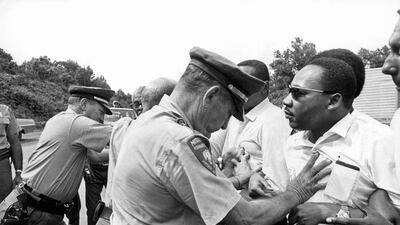Much commentary this week, here and elsewhere, will be focused on the 70th anniversary of the establishment of Israel and the Nakba, or catastrophe, for the Palestinians that ensued, as well as on the opening of the new US embassy in Jerusalem.
I will leave others to comment on that to recall that this year is also 50 years on from 1968, a year sometimes described as "the year of revolt".
A whole range of events happened that year which, in retrospect, were to prove of lasting significance. In January, the Tet offensive began in South Vietnam, which effectively put an end to any US hopes of being able to win its war against the North Vietnamese and the National Liberation Front.
The same month, Alexander Dubcek was elected as a reforming first secretary of the Communist Party of Czechoslovakia, ushering in a period of liberalisation and democratic change that became known as the "Prague Spring".
In March, US civil rights leader Martin Luther King was murdered. In May, the events in Paris and elsewhere saw an alliance of young people and trade unions seeking radical reform nearly bring down the government of France's then president Charles de Gaulle.
In June, senator Robert Kennedy, a bright hope of the anti-war elements in the US, was assassinated. In August, Soviet tanks rolled into Czechoslovakia, bringing to an end to the Prague Spring and crushing the hopes of democrats across Eastern Europe.
And in October, one of the largest protest demonstrations ever to take place in Britain against the Vietnam war took place in London, following on from an earlier event the previous March.
Twelve years ago, in 2006, I sat with my daughter in a cinema in Abu Dhabi to watch the film Bobby, which reconstructed Kennedy's assassination. At the end of it, my daughter asked why I had tears running down my face.
With some difficulty, I tried to explain to her something of what it meant to live and to be politically active throughout 1968. It was a rollercoaster of a year, which raised hopes for change followed by the brutal crushing of dreams.
The hammer-blows of the killings of King and Kennedy and of the invasion of Czechoslovakia made it seem, at least to a naively optimistic radical, that the establishment on both sides of the Iron Curtain, then dividing Europe between East and West, could not be shaken or removed.
Some memories of my own political activism that year remain particularly vivid. On the internet, one can find a film of the March anti-Vietnam war protest in London, described in the breathless – and inaccurate – commentary as “a bloody riot that Britain has never before witnessed”.
One clip shows me struggling with a line of police outside the American embassy. There is no film though, as far as I can tell, of another anti-Vietnam war demonstration in Sofia, Bulgaria, in August, when I and others experienced the dubious delights of a troop of brutal communist policemen riding their horses over us.
Nor can I trace a record of the occasion a week later when, shortly before the invasion of Czechoslovakia, I spoke at a public meeting in the main square of Prague to deliver a message of support from Britain’s Young Liberals. A few days later, Soviet troops on the Austrian-Czech border blocked me at gunpoint from re-entering the newly occupied country.
Some of the issues of that year are still with us. The passage of civil rights legislation in the US has not removed all of the injustices against which King fought, as the Black Lives Matter campaign shows.
The impact of Israel's victory in the June War, only a year old in 1968, is still with us, as we see daily in Gaza.
Yet the Vietnam war is now part of history, as are the Soviet Union and its satellite dictatorships in Eastern Europe.
The apartheid regime in South Africa, another focus of protests in 1968, has long since faded away.
Today, there are new challenges to face – here in the Middle East and elsewhere – political, social and environmental. There are new conflicts, new crises and (something we didn’t have to face in 1968) humanitarian disasters on a scale not seen since the Second World War, such as the plight of those affected by the conflicts in Syria, Iraq, Yemen and, much overlooked, in Africa and among the Rohingya of Myanmar.
Is there a lesson to be drawn from it all? Perhaps yes, especially as the month of Ramadan begins: the lesson that there is always a hope for a better world and that it is never too early nor too late to play a part in working for one.
Peter Hellyer is a consultant specialising in the UAE’s history and culture


